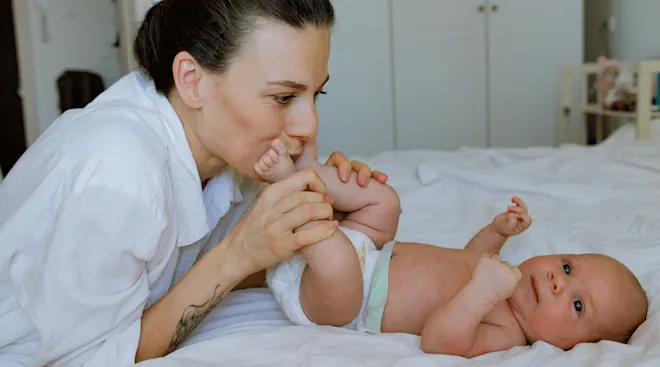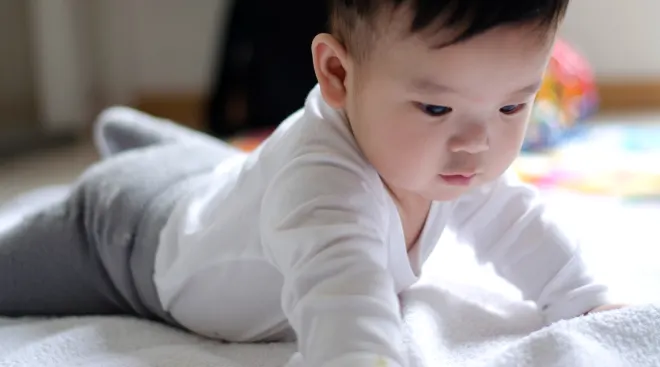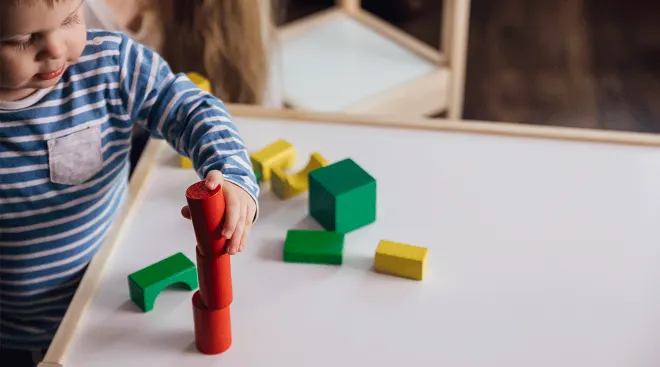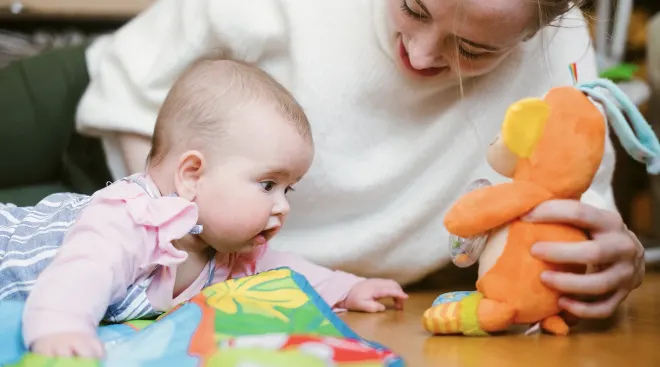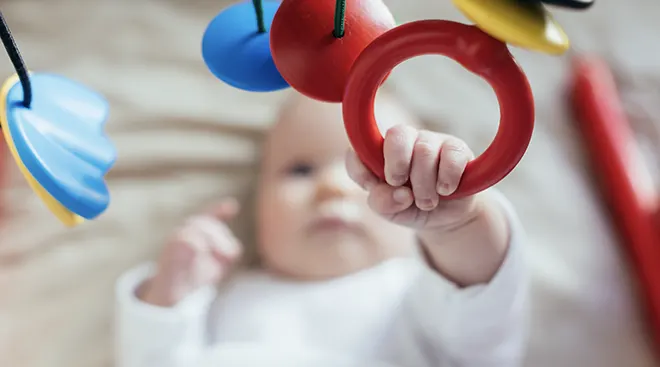How to Address Your Child’s Developmental Delay During the Pandemic
In March of 2020, the world went into quarantine thinking it would be just a few weeks of home-cooked meals and inconveniences. But the lingering COVID pandemic and social distancing requirements continue to create challenges for families—including those who are concerned about a potential developmental delay in their child and want to seek out an evaluation. They’re unsure of how to proceed: Do they prioritize their child’s development and see a professional, or do they protect their health and safety by avoiding in-person visits? Here, I lay out some steps you can take so you don’t have to sacrifice either.
In non-COVID times, parents would go to their child’s well-visit appointment, talk through developmental milestones with the pediatrician and make a decision about a referral to Early Intervention Services, a program that offers free evaluations for children up to 3 years old. They might also observe their child in relation to their peers in a classroom environment or play group and decide to seek outside help. But with many families having limited interaction with other kids and not attending regular, in-person doctor’s visits, many of the behaviors that would warrant an evaluation are being missed.
In the 0 to 3 population, there are certain critical baby and toddler milestones that should be met. If you notice any of the following, you should seek an evaluation by a professional:
Speech and language skills
- Limited babbling or consonants at 7 months
- Child not responding to name by 9 months
- History of more than two ear infections in a six-month period
- No interest in communicating
- No words by 15 months
- Excessive drooling in the absence of teething past 1 year
- Sudden loss of language skills
- Sudden onset of stuttering that lasts for more than six weeks
Motor skills
- Not bringing hands to midline (center) by 10 months
- Hands frequently clenched past 6 months
- Skipping learning to crawl
- Not independently holding a bottle by 12 months
- Not pulling to stand by 12 months
- Not walking by 15 months
- One side notably stronger than the other
Cognition and socio-emotional skills
- Limited eye contact after 3 months
- Lack of social smile by 4 months
- Avoids reciprocal play, such as peek-a-boo, or rolling a ball back and forth by 12 months
- Continues to bang toys rather than play productively after 18 months
There’s a reason why early intervention is so popular—it’s extremely effective, and the earlier problems are identified and treated, the easier it is to make a lasting impact in the child’s life. When babies are born, they have 100 billion neurons that are used to learn everything a child needs to learn. As time goes on, babies begin to lose neurons as they discover what they need to know. Babies and toddlers continue to make connections to strengthen the important information, with a crucial period happening between birth and 3 years of age. After that point, children still make new connections, but it takes a much longer period of time, with much more frequent repetition.
With no clear end to the pandemic in sight, a lot of parents who had put off in-person evaluations for fear of spreading coronavirus are now tired of waiting and are making appointments. As a result, many local agencies are overwhelmed and backlogged, and families are having to wait three to four months for an evaluation. When it comes to early childhood, time really is of the essence. If you suspect an issue, contact a professional for a consultation or full evaluation, if warranted.
With delays in all states for in-person evaluations and therapies, some families feel like they’re on their own. Luckily, the therapeutic community has identified these challenges, and there are many opportunities for parents to find support elsewhere while awaiting in-person services. Here, some potential options.
Virtual Parent Coaching
Parent coaching has been around for a long time, but the COVID pandemic has brought it to the forefront. Rather than using a more traditional direct therapy model, with a therapist working with your child, parents receive weekly coaching sessions to learn strategies to enhance their child’s development.
In the program that I offer, Tiny Talker Toolkit, parents attend a training call once a week, and then submit videos for feedback the remainder of the week to ensure that they have the support they need to get their child’s communication skills on track. This same teaching style has been proven effective for motor development and socio-emotional development as well. For physical therapy, consider Kinesio Kids, and for socio-emotional development, check out the Autism Speaks YouTube channel, which offers free training for parents in developing play and communication skills if autism is suspected.
Not only does parent coaching eliminate the need for face-to-face interventions, but it also helps to empower parents and give them new tools to better support their children on an on-going, daily basis. After seeing the success of this approach over the past few months, I believe parent coaching is here to stay.
Online Support Groups
When dealing with developmental delays, it’s crucial for parents to have a support group. Because you’re no longer meeting parents in waiting rooms or participating in classes together, online forums—such as Wolf + Friends, Apraxia Kids or Tots on Target—are great places to connect with others who are going through a similar experience. These spaces also have the benefit of professional input for general inquiries, which can be a great place to get started and find out if an evaluation is the best solution for you and your family.
Podcasts
Another great resource to come out of the pandemic are parent-directed podcasts. Podcasts offer parents a way to absorb information while they’re on the go, and a way to find some human connection in this socially distant world. Shows like Postpartum Push are great for new moms who want to absorb information from infant specialists, while Milestones walks parents through what to expect during the evaluation process and serves up episodes geared at helping your child thrive. The Sensory Project Show and Coffee and Cosleeping put a humorous spin on parenting while also giving families the support they need to help their children in all aspects of development.
Now, more than ever, we’re seeing just how interconnected we are. We may be close to seeing an end to this pandemic and quarantine life, but many of the tools and strategies we adapted to adhere to social distancing measures are going to be helpful as we navigate this new world.
About the expert:
Jocelyn M. Wood, MA, CCC-SLP, is a bilingual speech language pathologist with over a decade of experience. She specializes in working with parents who are seeking advice on how to introduce speech and language activities into everyday routines. Her work has been featured in The Bump, Romper and Fatherly. To learn more about her six-week virtual parent coaching program, visit tinytalkers.jocelynmwood.com or find her on Instagram @speechwithjwo.
Please note: The Bump and the materials and information it contains are not intended to, and do not constitute, medical or other health advice or diagnosis and should not be used as such. You should always consult with a qualified physician or health professional about your specific circumstances.
Navigate forward to interact with the calendar and select a date. Press the question mark key to get the keyboard shortcuts for changing dates.
Advertisement
Advertisement
Advertisement
Advertisement

































